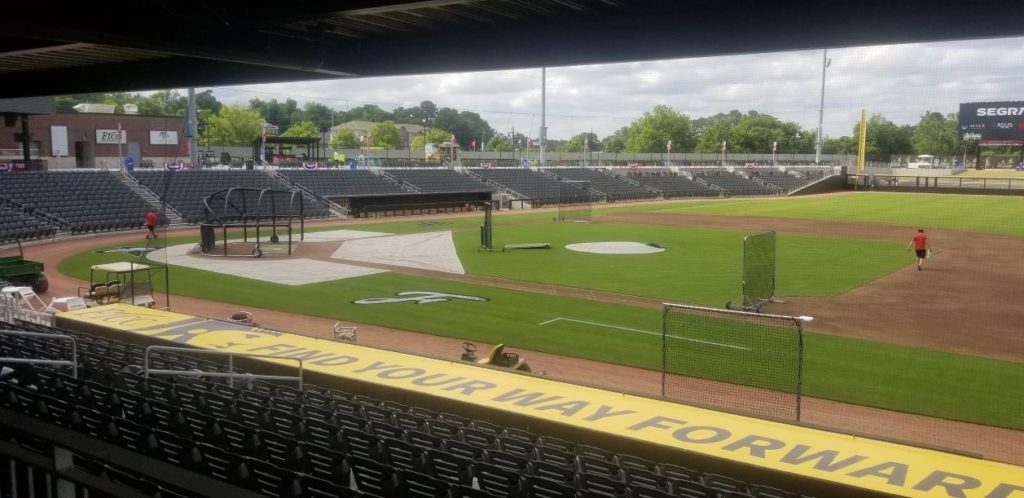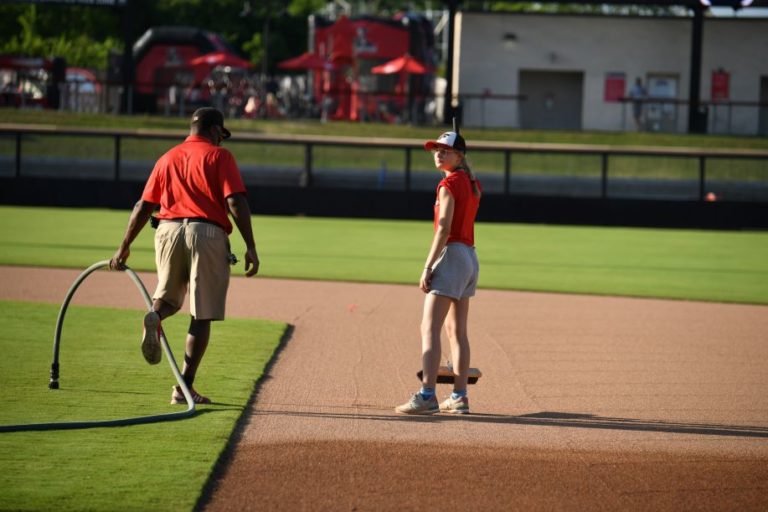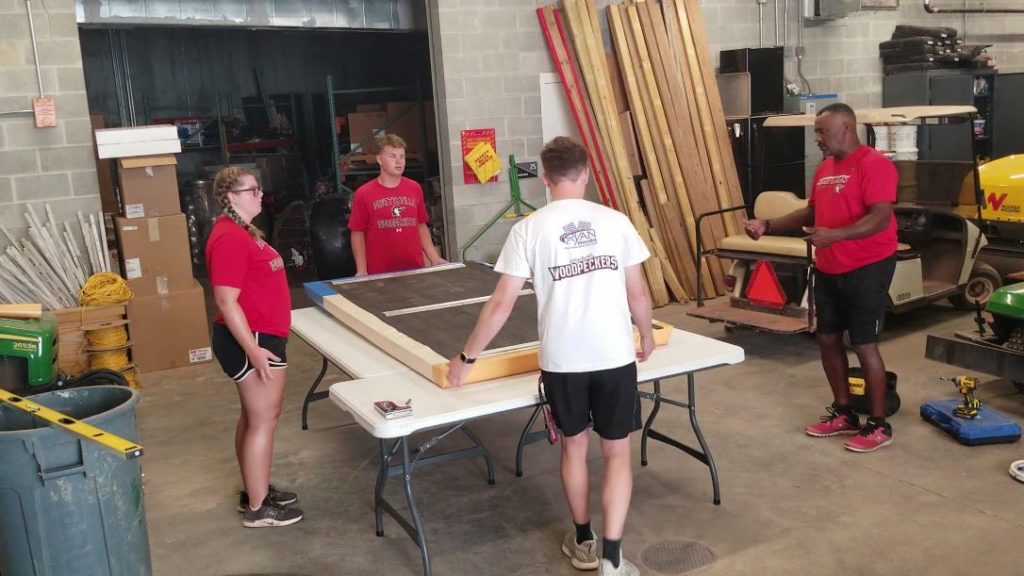By Alpha Jones, CSFM
High school… “the formative years.” It is one of many labels used to describe that time in our lives. For most, it is a time full of fun, friends, activities, learning; and suddenly it’s over. Then comes a decision that possibly maps our way for the next 40 years: what profession to pursue? Did you stay on that path? I didn’t.
Let’s take a little trip. Picture it; the year is 1985, dead center of the decade of big hair, acid-wash jeans and bomber jackets. Nobody carried a cell phone or wore a FitBit. In 1985, perhaps the greatest basketball player ever was NBA Rookie of the Year – “From North Carolina! At guard! 6’ 6” Michael Jordan!”
And in 1985 I graduated from Swissvale High School (now known as Woodland Hills High School) in Pittsburgh, Pa.
In high school, my guidance counselor recommended I read a book titled What Color is your Parachute? by Richard Nelson Bolles. The book contained a self-assessment questionnaire that gathered information about the taker through the answers given, (i.e., determine a career that suits your interests). I was drawn to the popularity of computers, especially personal computers; and, after receiving my results, I was happy with the outcome, because I knew that computers were my future and the assessment read the same.
My results indicated two areas of interest, computer science, which I knew, and agriculture. Agri-what???? Isn’t that, like, farming? I was baffled by the interest in farming. I grew up in the great city of Pittsburgh. We didn’t farm! My dad had a backyard garden, but that was his thing. My parents grew up in small-town Mississippi, where agriculture was everywhere. I have family members who farmed cotton, and generations of Joneses in Mississippi were dairy farmers, but, for me, farming? Computers it is!
I enrolled at the University of Pittsburgh and majored in computer science. Around the same time, I started a serious relationship with a beautiful young woman, who is now the mother of my three children, and to whom I have been married for 35 years. School wasn’t going well, my computer career seemed lost, and I couldn’t find my way. I was unable to find a path that would consistently progress forward.
We relocated to North Carolina, where I worked in computer operations for North Carolina Mutual Life Insurance. It was not programming or designing computers, but I was around computers. Family quickly became my primary focus, and the finish line seemed harder to reach; this increased the feeling of being lost on my path.
But farming?
A couple years later, while still in computers, I had a co-worker whose church needed someone to mow the lawn.
Quick flash back to 1985. If you know anything about Pittsburgh, you know there is nothing flat there – and that included the yard at my house. Our property was built into a hill, the entire yard was on a slope, and it took five hours of push mowing. Riding mower? Nope. My dad was concerned it would roll over on the steep hills of our yard. The church took 45 minutes of push mowing on flat ground, which seemed easy enough. I contracted to mow the church yard, and by the end of summer I had five mowing contracts. But farming?
My business grew in a few short years, and I needed to choose between computer operations or going full time. A fellow business owner told me my company would not grow until I was hungry. Translation: my computer job kept me fed when my business didn’t. So, I leapt on faith, and business took off.
I learned as much as I could about lawn and landscape care and then management. I attended training courses and equipment demos, read books, and asked every question I could. Growth led to hiring employees.
A major moment came one day while eating lunch with my wife at our local Wendy’s restaurant. I noticed two men in shirts and ties who were part of the Wendy’s management team. They were directing the staff on the store’s service, cleanliness and food preparation. I approached the gentlemen, introduced myself, and inquired about their landscape maintenance contract, expecting a “no.” I painted a detailed picture of my company and how our services could help with landscape improvements to enhance the customers’ experience. Within a month, I contracted to service 18 corporate-owned stores. I had made the big time!

For the next nine years, the business grew and became king in the fast-food landscape management world. I contracted with McDonald’s Corporation to service several of their corporate-owned stores. But in 2000, along came the big-name, national landscaping companies. Competition was too stiff, so I sold the landscape company. I was hired shortly after as the head groundsman for a private school, Durham Academy. I oversaw the landscape management of the new primary school campus and the high school campus. The timing was perfect for me to transition from business owner to employee (while at Durham Academy, I was earning an undergraduate degree – this time in Political Science).
But I was ready for the challenge of the campus grounds, as I had done similar work with high-end residential, apartment complexes and commercial properties. I was familiar with much of the native plant material and new plants found throughout the landscaped areas of the campuses. What I had no idea how to manage were the athletic fields. We had tennis courts, baseball and softball fields, a lacrosse field and a large common practice area that was used constantly by every team.
Like many private schools, there were high expectations for the teams and the facilities in which they played. The year I started, money was donated to build a new soccer field on the school’s prime location where everyone would see it. Soccer was the top fall sport, and men’s lacrosse was THE sport. Many student athletes aspired to play at nearby Duke University in either of these sports.
My new boss was under pressure to improve all the athletic facilities. He connected me with the local Minor League Baseball team, the Durham Bulls. Their head groundskeeper was to be a resource for information on maintaining the baseball and softball fields, so I met with the Durham Bulls Head Groundskeeper, Jimmy Simpson.
I hit Jimmy with a few simple questions, and, upon hearing his answers, I quickly realized I had a lot to learn about baseball field use and maintenance. The more we talked, the more I noticed Jimmy’s passion and enthusiasm for the work at hand. I was surprised by the amount of his firsthand knowledge with the different areas of the field and the products that made up the playing surface – just for the game of baseball.
Two and half hours later, I filled out an application to be a seasonal grounds crew member, I had learned some basics about baseball field maintenance, and, most importantly, I had a resource from which to learn much more. I just had no idea how much more.
I was learning skills that helped on my new job with enhanced knowledge of plant nutrition, drainage and grading. What I didn’t anticipate learning was the importance of being a team member. During the day at Durham Academy, I was focused on being the leader, creating plans and schedules to accomplish the work of improving the campus landscape and athletic fields. At night, as the new person, I was figuring out Minor League Baseball field maintenance, raking clumps and sweeping dugouts.
Fast forward five years at Durham Academy, and I get a call to be the team lead for the WakeMed Soccer Park field maintenance team. I had moved up the ladder in position, responsibility and facility prestige. I was impressed with the vision that the Town of Cary had for the facility, and I quickly bought in. The crew and I maintained 7.5 soccer fields. We had native soil fields that were for everyday use by lower skill level groups, tournament rentals, and other events. There were three sand-based fields, two premium practice fields and the stadium field. The goal was to make the WakeMed Soccer Complex the premier place to host NCAA and other soccer association championship events.
In no time, I had similar concerns that my team at Durham Academy and my landscape employees had. Things like “we need better equipment” and “there must be a better/easier way to do this.” I found the best response to my team was an explanation of how we’re going to do it with what we have on hand.
Then there was the challenge of getting all the crew members to work together and improve the quality of playing surfaces while maintaining them. I was a person who at that time knew more about leading by example and the “my way is the right way” approach. These approaches worked in some respects, but they were also challenged by some crew members and others from throughout the organization.
Some team members chose to leave, and some were transferred out. There was a real need to pull the team together. I proposed doing a social outing with the team, and each of us was to bring a “date” or significant other. We went bowling, with no idea of what the impact would be. We shared some laughs, beer and fun. More importantly, we started to see each other as human beings – real people who had differing viewpoints and beliefs; but we had the mission of improving WakeMed soccer facility in common.
We began to gel as a team, navigating hectic schedules for field use and improving on equipment maintenance; and, most importantly, the playing surfaces were getting better. We also completed one other team-building project: turning our too-small office space into a locker room that could accommodate everyone. The improved attitudes made leading the diverse team easier.
While at Wake Med, I received admission into law school, and I chose to attend. It was a tough challenge, and very hard on my family. After I had a year of law school under my belt, I went to work for the Durham Bulls full time. I added to my sports field management skills, through a great deal of self-reliant hands-on work such as re-sodding, aerifying, and verticutting. I improved my tractor-driving skills, and I learned how to operate and maneuver the spray truck.
I was then brought in as a consultant for Longwood University because they had made the jump to Division I sports and wanted/needed to bring their athletic facilities up to the required level. There were major issues that hit against all three parts of the SFMA mantra of safety, playability and aesthetics. I provided insight on improvements to their facilities and playing surfaces. After consulting for a year, I was hired as an assistant athletic director. I had a seat at the table, which allowed me to successfully impact administrative decisions for facility upgrades and budgets for playing surface improvements. The administrator role gave me a true behind-the-curtains look at the business of athletics. Longwood answered both calls for me as a sports field manager and an administrator. It was there that I learned and accepted that sports field management includes the skills necessary for farming, but there is much more.
Preach, teach and cast vision
My career has followed a non-traditional route. I have had fantastic opportunities to work in several places – each with its own unique culture and different people. I learned to adapt what I knew to the next place, with an emphasis on creating a new path, while at the same time not losing the integrity of what was already in place.
In each stop, I was tasked with making improvements – to the playing surface, to the facility, to the culture of the team. A common hurdle for improvements is having everyone involved on the same page. As mentioned, early in my career I was a lead-by-example person. If others see me do it, they will do it too. But that is not always true. Others will see you do it, and then watch you do it some more. This can get frustrating. That frustration helped me to seek ways to get others on the same page.
My father is a retired pastor. Like sports field managers are perceived to just cut grass, many assume that all pastors do is preach from the pulpit. However, pastors are leaders with a responsibility to care for their congregation, while field managers are leaders with a responsibility to care for their field(s), facility and staff. Both situations need good leadership to gain success.
I have heard it said that a pastor’s three main responsibilities are to preach, teach and cast vision. What does this have to do with sports field management? As the leader of your group, you must have a vision. The vision could be for how your field(s) will look when ready for use, or how your team will operate together to accomplish a goal. The clearer the vision is to you, the easier it is to convey it to others. You must be able to talk about your vision in full detail. If you do this with your group, you are casting your vision.
Then, be able to “preach” about the vision you have, telling others what it is and how it will work. Your sharing of the vision will help others to see your belief in, and your passion for, the vision.
Teaching is the imparting of knowledge to help educate others and help them gain skills for themselves. Each person involved should be taught skills that they master and use to accomplish their part. The individual is improved through the knowledge gained and can now be empowered to do more. As skills are taught, leaders need to re-share the specifics of the vision.
I have used different methods for casting the vision in each improvement project and maintenance routine. I’ve found unique ways to convey the message of the improvements, and I helped teach skills that met the needs of the vision. The groups I worked with have accomplished many things.
I found my way in life through sports field management, and now know it is my calling. The experiences, opportunities, and people I have met along the way humble me. I never became a farmer, but I clearly see the connection between agriculture and my passion for sports field management. It is more than cutting grass, it is cultivation. Cultivating relationships; cultivating individual skills; and, most importantly, cultivating the vision – your vision – by casting it, preaching it, teaching it, and then watching it grow!
Alpha Jones, CSFM, is the director of field operations for the Fayetteville Woodpeckers, MiLB affiliate of the Houston Astros, overseeing all field related operations and maintenance at Segra Stadium. A long-standing member of the Sports Field Management Association (SFMA), as well as the North Carolina and Virginia SFMA chapters, Jones has served on the VSFMA Board of Directors, SFMA Conference Education and Tours Committee, and Environmental Facility Certification Committee. He currently serves as a director at large on the SFMA Board of Directors, as well as chairperson of the SFMA Learning Initiatives Committee and chair of the MiLB Task Group.





